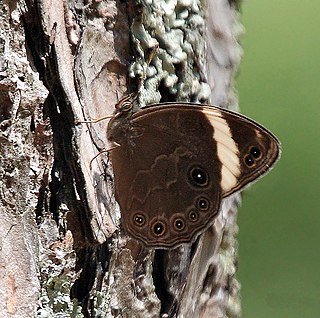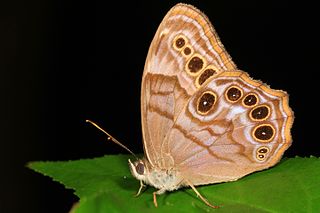In Greek mythology, Lethe, also referred to as Lesmosyne, was one of the rivers of the underworld of Hades. Also known as the Amelēs potamos, the Lethe flowed around the cave of Hypnos and through the Underworld where all those who drank from it experienced complete forgetfulness. Lethe was also the name of the Greek spirit of forgetfulness and oblivion, with whom the river was often identified.

Lethe is a butterfly genus from the subfamily Satyrinae in the family Nymphalidae. The genus was erected by Jacob Hübner in 1819. It includes the treebrowns, woodbrowns, foresters and their relatives. The species in the genus Lethe occur in temperate-tropical southern and eastern Asia, up to Indonesia and in North America.

Lethe jalaurida, the small silverfork, is a species of Satyrinae butterfly found in western China, Sikkim and Burma.

Lethe armandina, the Chinese labyrinth, is a species of Satyrinae butterfly found in western China, Assam and Burma.

Lethe Vallis is a valley in the Elysium Planitia on Mars, located at 4° North and 206.5° West. It is 225 km long and is named after river Lethe in Katmai National Monument, Alaska, USA. Lethe Vallis originates at the SE margin of the West Elysium Basin. West Elysium Basin probably contained a lake that was 500 km across and received water from Athabasca Vallis. It was probably formed in just days or weeks and had a discharge about like the Mississippi. Some have suggested it was formed from lava flows, but lava would not be able to flow over such a low gradient for so long a distance.

Lethe anthedon, the northern pearly-eye, is a species of butterfly of the subfamily Satyrinae in the family Nymphalidae. It is found in North America, from central Saskatchewan and eastern Nebraska east to Nova Scotia, south to central Alabama and Mississippi.

Lethe creola, the creole pearly-eye, is a species of brush-footed butterfly in the family Nymphalidae. It is found it the United States from North Carolina and central Georgia west to eastern Oklahoma and eastern Texas. Some authorities include this species in the genus Enodia as Enodia creola.

Lethe chandica, the angled red forester, is a species of Satyrinae butterfly found in the Indomalayan realm.

Lethe insana, the common forester, is a species of Satyrinae butterfly found in the Indomalayan realm The larva feeds on Arundinaria falcata

Lethe serbonis , the brown forester, is a species of Satyrinae butterfly found in the Indomalayan realm

Lethe latiaris , the pale forester, is a species of Satyrinae butterfly found in the Indomalayan realm

Lethe verma , the straight-banded treebrown, is a species of Satyrinae butterfly found in the Indomalayan realm

Lethe siderea , the scarce woodbrown, is a species of Satyrinae butterfly found in the Indomalayan realm. The species was first described by George Frederick Leycester Marshall in 1880. It is legally protected in India under Schedule II of the Wild Life (Protection) Act, 1972.
Lethe violaceopicta, the Manipur woodbrown, is a species of Satyrinae butterfly found in the Indomalayan realm.

Lethe dura, the scarce lilacfork, is a species of Satyrinae butterfly found in the Indomalayan realm.

Lethe andersoni is a species of Satyrinae butterfly found in the Indomalayan realm.














